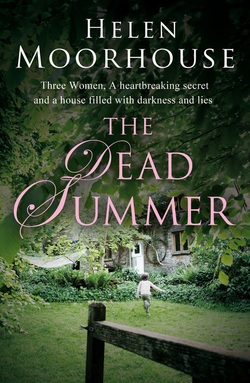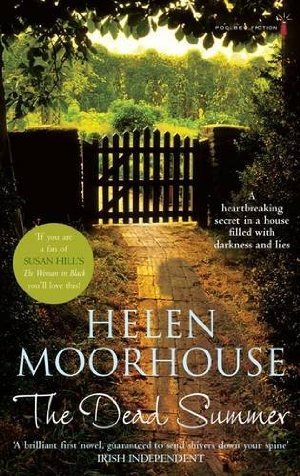"Not for the faint-hearted..." Irish Independent
"IF a ghost story can be measured by its ability to scare the daylights out of its readers then The Dead Summer is very good indeed.
The debut novel of Laois-born Helen Moorhouse, it opens innocuously enough with a gaggle of giggling city girls raising champagne flutes to erstwhile colleague Martha, a single mum who has chucked her job in a London advertising agency to fulfil her lifelong dream of becoming a children's novelist. To this end Martha has taken a six-month lease on Hawthorn Cottage, a whitewashed idyll in deepest Norfolk where she plans to move with her baby daughter. So far, so wonderful. Until she moves, and the noises start -- the ghostly footsteps, the inexplicable scraping, the unearthly wails.
Then there's Rob Mountford, Martha's landlord, whose moneyed family has owned the surrounding land for generations. What is it about this big, blundering but seemingly harmless young rustic that makes Martha so uneasy? Why are the locals so reluctant to discuss the history of Hawthorn Cottage? And who is the crone who hangs around the local pub muttering darkly about previous occupants of Eyrie Farm -- as Hawthorn Cottage was once known?
As events unfold we learn something of the cottage's dark past via a series of letters penned by Dublin-born Lily in the Fifties. When Lily's sister Marion gets pregnant out of wedlock, the pair are dispatched to Norfolk by their scandalised parents, where their father's wealthy old friend Mountford has agreed to put them up, rent free, in Eyrie Farm.
Tasked with minding her wayward, unpredictable and often violent sister, while keeping her delicate condition under wraps, Lily keeps herself sane by committing her thoughts to paper in a series of letters written to her old school friend Caroline, now a nun in a Dublin convent.
Starting in March 1953, the letters detail the trials and tribulations of life in Norfolk. Lily writes of the bone-chilling cold, of her sister's increasingly erratic behaviour, and of her own fears for the future. These fears are soon realised with the sudden death of the girls' mother; following which their father, demented with grief, severs all contact with his daughters.
The arrival of Marion's son Henry shortly afterwards serves only to complicate matters further. Having somehow managed to catch the eye of a highly respected local man, Marion, realising that her marriage prospects are stymied if word of her child gets out, resolves to keep him hidden from the outside world. But as he grows from baby to toddler, how far is little Henry's increasingly unhinged mother prepared to go to keep his existence secret?
Meanwhile, in the same cottage more than half a century later, Martha is struggling to write frothy works of fiction while surrounded by malevolent forces that conspire to drive her, if not completely mad, then certainly back from whence she came? Enter parapsychology student Will, who, with spirit medium Gabriel, arrives to investigate ghostly goings on. He discovers a lot more than he bargained for ...
In the introduction, Moorhouse admits to being fascinated by the notion of ghosts while simultaneously being terrified by the prospect of ever meeting one. Certainly the prospect of meeting any of those conjured from the grisly depths of her imagination would be terrifying indeed. Not for the faint-hearted."
Margaret Carragher, July 3rd 2011
Sunday Indo Living
See original review here
The debut novel of Laois-born Helen Moorhouse, it opens innocuously enough with a gaggle of giggling city girls raising champagne flutes to erstwhile colleague Martha, a single mum who has chucked her job in a London advertising agency to fulfil her lifelong dream of becoming a children's novelist. To this end Martha has taken a six-month lease on Hawthorn Cottage, a whitewashed idyll in deepest Norfolk where she plans to move with her baby daughter. So far, so wonderful. Until she moves, and the noises start -- the ghostly footsteps, the inexplicable scraping, the unearthly wails.
Then there's Rob Mountford, Martha's landlord, whose moneyed family has owned the surrounding land for generations. What is it about this big, blundering but seemingly harmless young rustic that makes Martha so uneasy? Why are the locals so reluctant to discuss the history of Hawthorn Cottage? And who is the crone who hangs around the local pub muttering darkly about previous occupants of Eyrie Farm -- as Hawthorn Cottage was once known?
As events unfold we learn something of the cottage's dark past via a series of letters penned by Dublin-born Lily in the Fifties. When Lily's sister Marion gets pregnant out of wedlock, the pair are dispatched to Norfolk by their scandalised parents, where their father's wealthy old friend Mountford has agreed to put them up, rent free, in Eyrie Farm.
Tasked with minding her wayward, unpredictable and often violent sister, while keeping her delicate condition under wraps, Lily keeps herself sane by committing her thoughts to paper in a series of letters written to her old school friend Caroline, now a nun in a Dublin convent.
Starting in March 1953, the letters detail the trials and tribulations of life in Norfolk. Lily writes of the bone-chilling cold, of her sister's increasingly erratic behaviour, and of her own fears for the future. These fears are soon realised with the sudden death of the girls' mother; following which their father, demented with grief, severs all contact with his daughters.
The arrival of Marion's son Henry shortly afterwards serves only to complicate matters further. Having somehow managed to catch the eye of a highly respected local man, Marion, realising that her marriage prospects are stymied if word of her child gets out, resolves to keep him hidden from the outside world. But as he grows from baby to toddler, how far is little Henry's increasingly unhinged mother prepared to go to keep his existence secret?
Meanwhile, in the same cottage more than half a century later, Martha is struggling to write frothy works of fiction while surrounded by malevolent forces that conspire to drive her, if not completely mad, then certainly back from whence she came? Enter parapsychology student Will, who, with spirit medium Gabriel, arrives to investigate ghostly goings on. He discovers a lot more than he bargained for ...
In the introduction, Moorhouse admits to being fascinated by the notion of ghosts while simultaneously being terrified by the prospect of ever meeting one. Certainly the prospect of meeting any of those conjured from the grisly depths of her imagination would be terrifying indeed. Not for the faint-hearted."
Margaret Carragher, July 3rd 2011
Sunday Indo Living
See original review here
Leaving behind a broken marriage and a city life she no longer wants to lead, Martha Armstrong takes her baby daughter to start again in the beautiful English countryside. Living in a tranquil cottage in the heat of a perfect summer, it seems that all her wishes have come true.
Until the noises start.
Plagued by mysterious footsteps, scratchings and crying in the night, Martha is at first unnerved and then terrified. What is happening to her idyllic existence? Is it all her imagination or is someone persecuting her?
Little does Martha know but the cottage has witnessed terrible hatred, fear and pain in the past when two young Irish sisters lived in it. The fate of these girls and the baby born there now casts a dark shadow over Martha and her daughter.
Martha begins to unravel the story of the cottage's past and uncover the terrifying secret that still haunts it. But can she discover the truth in time to keep herself and her little girl safe from the evil that threatens them?
Just some of the praise for The Dead Summer:
"Compulsive reading...a brilliant first novel, guaranteed to send shivers down your spine" Irish Independent
"A classic chiller" The Irish Times (The Dead Summer was one of The Irish Times Top 30 reads for summer, 2011)
"Satisfyingly chilling from start to finish" Woman's Way
"Helen Moorhouse has a fresh, original voice. She has created a satisfyingly scary page turner" Irish Examiner
"An excellent debut. I had tingles down my spine as I read this and I couldn't read it fast enough" www.bookshelf.com
"Helen Moorhouse has applied skill, knowledge and respect to every word, making the squeaks and scratches in our homes take on a whole new meaning!" Evening Echo
The Dead Summer was released in trade paperback format in April 2011 and in paperback in January 2012.
Until the noises start.
Plagued by mysterious footsteps, scratchings and crying in the night, Martha is at first unnerved and then terrified. What is happening to her idyllic existence? Is it all her imagination or is someone persecuting her?
Little does Martha know but the cottage has witnessed terrible hatred, fear and pain in the past when two young Irish sisters lived in it. The fate of these girls and the baby born there now casts a dark shadow over Martha and her daughter.
Martha begins to unravel the story of the cottage's past and uncover the terrifying secret that still haunts it. But can she discover the truth in time to keep herself and her little girl safe from the evil that threatens them?
Just some of the praise for The Dead Summer:
"Compulsive reading...a brilliant first novel, guaranteed to send shivers down your spine" Irish Independent
"A classic chiller" The Irish Times (The Dead Summer was one of The Irish Times Top 30 reads for summer, 2011)
"Satisfyingly chilling from start to finish" Woman's Way
"Helen Moorhouse has a fresh, original voice. She has created a satisfyingly scary page turner" Irish Examiner
"An excellent debut. I had tingles down my spine as I read this and I couldn't read it fast enough" www.bookshelf.com
"Helen Moorhouse has applied skill, knowledge and respect to every word, making the squeaks and scratches in our homes take on a whole new meaning!" Evening Echo
The Dead Summer was released in trade paperback format in April 2011 and in paperback in January 2012.


